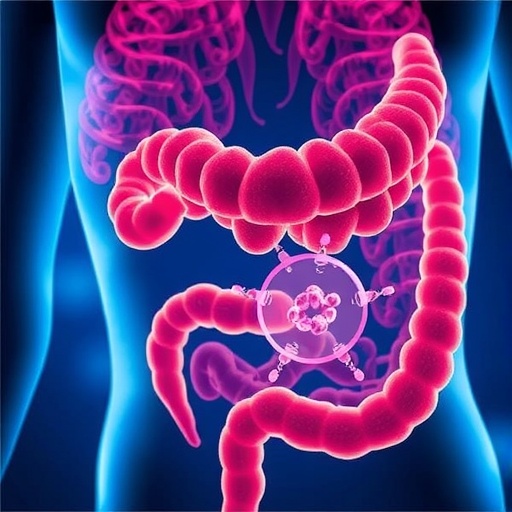Recent advancements in cancer research have unveiled a captivating interplay between the gut microbiome and various metabolic pathways that may influence the progression of diseases such as breast cancer. A groundbreaking study titled “Decoding the gut microbiota metabolite–matrix metalloproteinase-3 axis in breast cancer: a multi-omics and network pharmacology study,” conducted by Yuan, Xing, and Liu, delves into this intricate relationship using state-of-the-art methodologies that bridge multiple scientific disciplines. This pioneering research positions itself at the intersection of microbiology, oncology, and pharmacology, shedding light on therapeutic avenues that could emerge from this understanding.
The gut microbiota, a complex ecosystem comprising trillions of microorganisms, has garnered significant attention for its role in human health and disease. Emerging evidence suggests that these microbial communities profoundly influence host metabolism, immune response, and even the efficacy of therapeutic interventions. The study scrutinizes the metabolites produced by gut bacteria, specifically focusing on their interaction with matrix metalloproteinase-3 (MMP-3), an enzyme implicated in tissue remodeling and tumor progression. This landmark investigation illustrates how microbial metabolites can alter the expression of MMP-3, impacting breast cancer development.
Utilizing a multi-omics approach, this research encompasses genomics, transcriptomics, proteomics, and metabolomics, which collectively afford a comprehensive view of the biological processes at play. The incorporation of network pharmacology further enriches the analysis, enabling the researchers to uncover complex interactions and potential therapeutic targets. By integrating these methodologies, the study presents a nuanced understanding of how alterations in the gut microbiome can modulate systemic inflammation, a known contributor to cancer development.
One of the crucial findings of this research highlights the significant role of specific microbial metabolites in the modulation of MMP-3 levels. These metabolites, produced via microbial fermentation of dietary fibers, have been observed to possess anti-inflammatory properties. The study’s results suggest that when these metabolites are present in adequate quantities, they may inhibit the expression of MMP-3, thereby stifling pathways that facilitate tumor growth and metastasis. This revelation underscores the potential for microbiota-targeted therapies to serve as adjuncts to conventional cancer treatments.
Moreover, the research emphasizes the importance of dietary habits in shaping the gut microbiome composition. Diets rich in fiber promote the growth of beneficial bacteria that produce protective metabolites. Conversely, high-fat and low-fiber diets have been linked to dysbiosis, a state where the microbial balance is disrupted, leading to the proliferation of pathogenic bacteria. This dietary influence on microbiome-driven pathways opens intriguing possibilities for personalized nutrition interventions aimed at reducing breast cancer risk.
Further, the findings advocate for a more profound exploration into the gut-brain axis and its connection to cancer biology. The gut microbiome communicates with the central nervous system, influencing mood, stress responses, and ultimately, the body’s immune surveillance capabilities. Disruptions in this communication may pave the way for cancer progression, establishing a potential link between psychological factors and tumor behavior.
In the realm of network pharmacology, this study leverages computational tools to analyze complex biological networks and predict how different metabolic pathways intersect. By creating a detailed map of the gut microbiota’s interactions with host systems, researchers can identify crucial nodes in these networks, suggesting optimal points for therapeutic intervention. This systems biology approach exemplifies a shift toward holistic, integrative strategies in cancer therapy.
The clinical implications of this research are far-reaching. By characterizing the gut microbiome and its metabolic output, oncologists may one day be able to predict patient responses to specific treatments. Personalized medicine could evolve to incorporate microbiome profiling, which would tailor dietary and therapeutic interventions to each individual’s microbial makeup, enhancing treatment efficacy and minimizing side effects.
As this research progresses, it necessitates rigorous clinical trials to translate these findings into practical applications. The assessment of gut microbiota manipulation as a standard practice in breast cancer management could offer patients new avenues for care. This represents a significant departure from traditional oncology, moving towards a model that is as much about prevention and lifestyle modification as it is about direct treatment.
In summary, Yuan, Xing, and Liu’s research provides a vivid illustration of how the gut microbiome can shape breast cancer outcomes through its metabolites and their interactions with matrix metalloproteinase-3. This study not only broadens our understanding of cancer biology but also lays the groundwork for innovative therapeutic approaches that leverage gut health to enhance cancer treatment. The potential to redefine cancer management through microbiome-centered strategies offers a glimpse into a future where holistic patient care is paramount.
The insights gained from this research might inspire further studies exploring the microbiome’s impact on other cancer types, highlighting a burgeoning field of investigation that could revolutionize our approach to oncology. This pivotal study sets the stage for collaborative efforts across disciplines, ultimately leading to refined therapeutic strategies that holistically consider the interplay between diet, microbiota, and cancer biology.
In conclusion, as we continue to mine the depths of microbiome research, we unlock the door to previously uncharted territories in cancer treatment. The convergence of multi-omics and network pharmacology presents an exciting frontier, heralding a new era of personalized medicine that is deeply rooted in the body’s own microbial landscape.
Subject of Research: The interplay between gut microbiota and breast cancer development through metabolite interactions.
Article Title: Decoding the gut microbiota metabolite–matrix metalloproteinase-3 axis in breast cancer: a multi-omics and network pharmacology study.
Article References:
Yuan, T., Xing, J. & Liu, P. Decoding the gut microbiota metabolite–matrix metalloproteinase-3 axis in breast cancer: a multi-omics and network pharmacology study.
Mol Divers (2025). https://doi.org/10.1007/s11030-025-11351-y
Image Credits: AI Generated
DOI: 10.1007/s11030-025-11351-y
Keywords: Gut microbiota, breast cancer, microbiome, matrix metalloproteinase-3, multi-omics, network pharmacology, cancer therapy, microbial metabolites, dietary influence, personalized medicine.
Tags: advancements in cancer research methodologiescancer metabolism and microbiota interactiongut microbiota and breast cancerintegrative pharmacology and oncologymetabolites and matrix metalloproteinase-3microbial communities and human healthmicrobial metabolites in breast cancermicrobiome and immune responsemicrobiome influence on cancer progressionmulti-omics approach in cancer researchrole of enzymes in tumor progressiontherapeutic implications of gut bacteria





